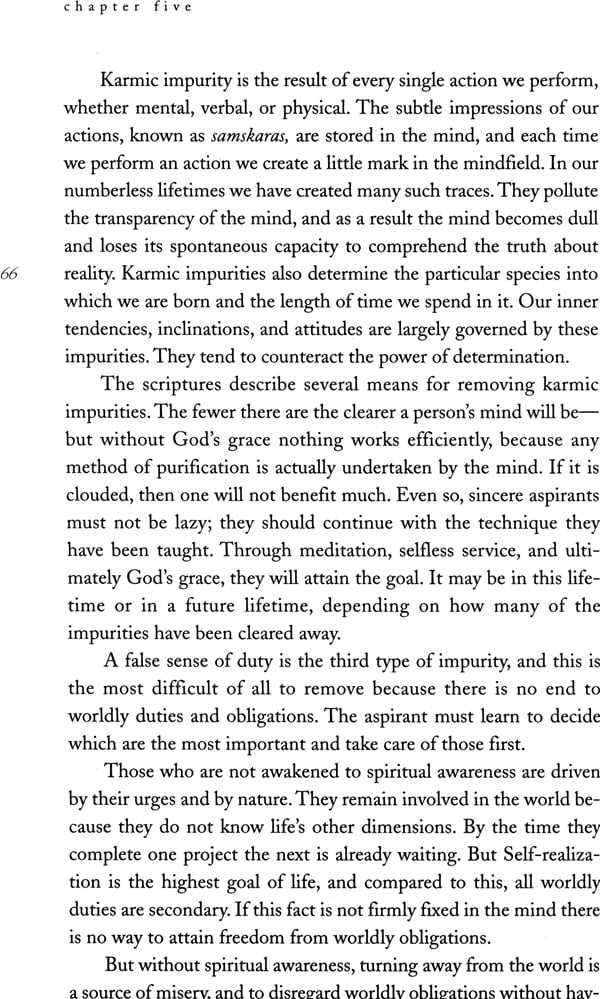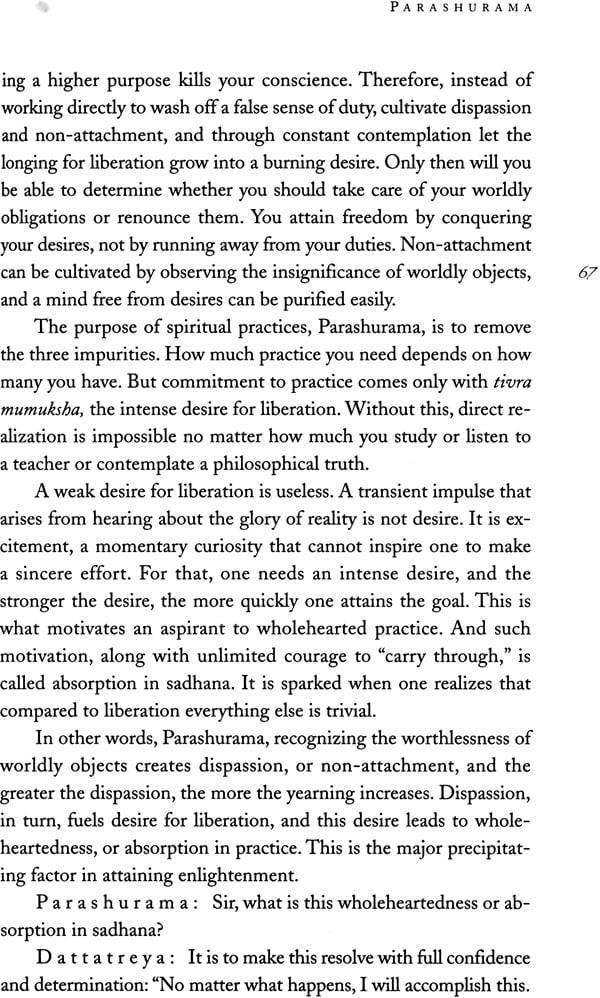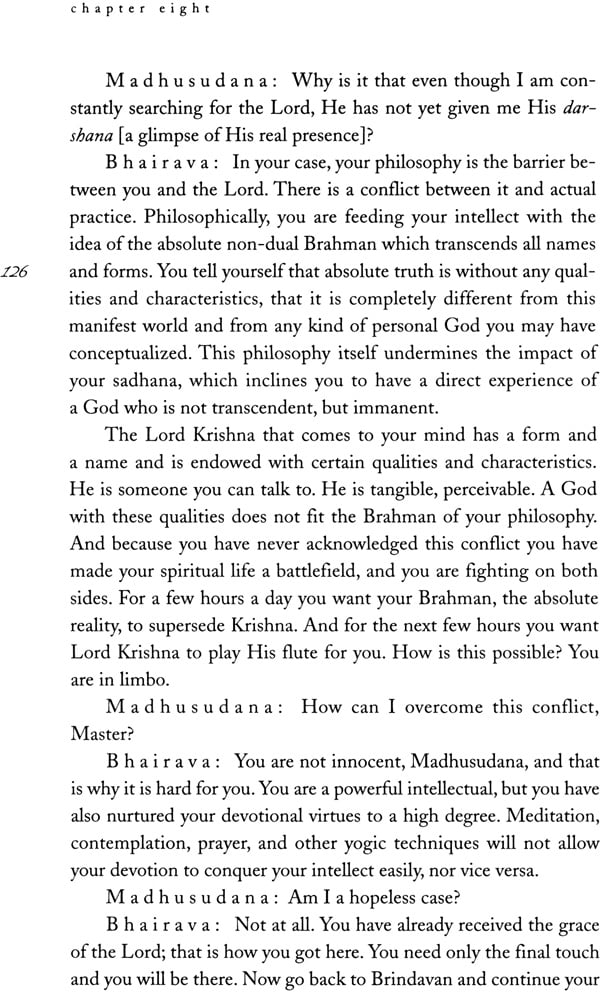
The Himalayan Masters (A Living Tradition)
Book Specification
| Item Code: | NAK166 |
| Author: | Pandit Rajmani Tigunait |
| Publisher: | Himalayan Institute |
| Language: | English |
| Edition: | 2002 |
| ISBN: | 9780893892272 |
| Pages: | 203 (1 B/W Illustrations) |
| Cover: | Paperback |
| Other Details | 8.5 inch x 5.5 inch |
| Weight | 270 gm |
Book Description
This Book Explokres the lives of eight Himalayan sages who held the distilled wisdom and power of the world's spiritual traditions. These sages belonged to a universal tradition that emphasizes the direct experience of truth, one not limited by bounds of religion, nationality, geography, era, or race.
Drawing from ancient Sanskrit texts and a 5,000- year-old oral tradition, Pandit Tigunait recounts stories and recorded dialogue that bring the experiences of these sages to life. These eight Himalayan masters knew how to live with success and health in the world while experiencing the innermost truths of existence. Learning about their lives will give you the practical insight you need to find your own way to such wisdom and truth.
Pandit Rajmani Tigunait, PhD, is the spiritual head of the Himalayan Institute. Family tradition gave him access to a vast range of spiritual wisdom preserved in both the written and oral traditions. As a young man, he lived and studied with renowned adepts before meeting his spiritual master, Sri Swami Rama of the Himalayas. Pandit Tigunait is fluent in both Vedic and Classical Sanskrit and has an encyclopaedic knowledge of the scriptures. He holds a doctorate in Sanskrit from the University of Allahabad, and another in Oriental Studies from the University of Pennsylvania. He has written more than a dozen books, running the gamut from scholarly analysis and scripture translation to spiritual biographies and practical advice on applying yogic concepts of the problems of daily life. In addition to lecturing and teaching worldwide for more than thirty years, Pandit Tigunait is the inspiration for the Institute's rural empowerment projects and the motive force behind the Himalayan Institute Community Centers taking root in Asia and Africa.
When we venture into unknown territory, it is reassuring to have a guide. This is what a spiritual lineage offers us. As questions arise and we encounter obstacles along the way, we can turn to those who have gone before us for inspiration and guidance. The Himalayan Masters: A Living Tradition is a collection of stories about the great sages from the Himalayan tradition, beginning with the Vedic seers and continuing to modern times. These sages struggled with the same issues that we all struggle with. And as they overcame the obstacles that stood between them and Self – realization they mapped the way for those who would follow after them. Passing on the teaching from generation to generation, these sages help lead aspirants to the highest reality.
Each of the stories in this book carries a unique message that will inspire seekers of even level, for they show how even these grate realized beings had their moments of doubt and despair and overcame them. There was Narada, who taught others the art of happiness, only to realize that he was not happy himself. Prince Rama fell into a deep depression and wandered for years in search of inner peace. Parashurama, a great warrior, was consumed with frustration, feeling totally dejected and hopeless. Vidyaranya Yati wondered what was wrong with his because he had not gained direct experience of the truth after more than eighty years of intense practice. Madhusudana Sarasvati, a brilliant philosopher of non-dualism, felt empty inside, and secretly yearned to experience what devotees did. And Swami Rama Kept breaking his practice because he could not always control his anger.
These weary travellers each found the help of a guide who clarified their confusion and inspired them to continue on their spiritual quest. Systematically, step by step, the masters explained how to overcome the obstacles that stand in the way. Be patient they would say. Train your body, mind and senses, have faith study the scriptures, seek the company of the wise, practice non attachment, meditate. Make all possible effort, and then surrender to divine will. Embrace each moment as it presents itself, seeing it as an opportunity to expand your awareness, until you are fully opened and prepared. Then when you least expect, it grace will dawn and you will experience oneness with the Divine.
Eventually each of these seekers became a channel through which the ancient teachings flowed, recast to apply to the time and place in which they were given. For me, swami Rama was that channel. When I first met him in 1978,I knew nothing about the tradition of the Himalayan masters, or the universal teaching of the Vedic lineage they have handed down over the ages. All I Knew was that when I was around him, I felt a sense of deep stillness and peace. And as I listened to him lecture and watched him with his students, I knew in my heart that I had found my teacher.
Swamiji cared a great deal about his students and gave up everything he could. For twenty five years he taught tirelessly both here and abroad. And no matter what the topic of his lecture, he would always stress the same basic points: "Sit with you head, neck and trunk straight. Breathe diaphragmatically. Discipline your body, mind and senses. Learn to know yourself on every level. Be happy. Grease your actions with love. Do not be attached to the fruits of your actions. Practice, practice, Practice."
While we clamoured for advanced practices, he kept teaching us he same basics, year after year, because he knew that mastering these basics was advanced practice. And those who understood knew that the real teachings were given in silence.
Swamiji guided and counselled us in many ways at times he was gentle and loving, at times and aloof. And he had a mischievous childlike side that enjoyed joking and playing with us. Those who wanted to get closer to him, however, soon found out it was like dancing with fire. The closer they got the hotter the blaze. He was a practical teacher, who created situations to make students learn to think for themselves and the experience was not always pleasant. Swamiji did not want us to be dependent on anyone or anything external, including him. He encouraged us to go within – to connect with our inner truth. "Meditation, he would say, "can give you that which nothing else can give you; it introduces you to yourself."
He constantly reminded us that we were merely guests passing through this transitory world. We should enjoy it, he insisted with-out forgetting that the true purpose of life is to return to our eternal home. Human life, he would say, is a gift, and we should not squander this marvellous opportunity to realize our divine nature.
Introduction The tradition of the Himalayan sages is an unbroken chain that extends for thousands of years, a living tradition that still exists today undisturbed by the passage of time. This tradition is not concerned with teachings that apply only to a particular era of history or geographical region of the world its entire emphasis is on the experience of that truth which is eternal and universal. To realize this truth is the highest goal of existence, although at different times and places, different terms have been used to describe it.
Even though the history of this ancient tradition remains shrouded in mystery, it is helpful for modern students to understand it and the lineage of sages who have carried on the teachings. But in seeking to study the tradition, students, no matter how sincere, are at a disadvantage. Many of the ancient texts do not exist in translation, are even when they do, their teachings require clarification and interpretation if they are to provide seekers with any practical guidance.
As Pandit Rajmani Tigunait explains, the unbroken chain of lineage in the Himalayan tradition goes back at least five thousand years (although Shankaracharya, the great philosopher and yogi formally established the tradition twelve hundred years ago). The sages passed their teachings on orally, each sage transmitting this knowledge directly to students who were prepared to receive it.
The Vedas are the sacred texts that contain the wisdom of these ancient sages. In fact, they are the oldest scriptures in the library of humanity. The sages, however, did not create the teachings of the Vedas – they are considered to be revealed teachings received intuitively by these great teachers in the depths of their meditative experiences.
Vedanta which is the essence or culmination of the Vedas, describes truth as non-dualistic and absolute, and later, sages elaborated on the content of the Vedas in the literature known as the Upanishads. But even these scriptures require interpretive guidance if they are to be practical use to modern seekers. In this text, Pandit Tigunait explains the Practical implications of these teachings to the modern student.
Meditation is the most powerful tool available to help those who are seeking t attain the experience of truth. It is the technique that helps students go beyond the mire of delusion and conflict that arises in the mind, for truth cannot be know with the mind itself. Many techniques can help students in the preliminary stages of their sadhana (spiritual practice), and it is true that for most, preparation of the body, mind, and personality is necessary to allow the full potential of meditation to be achieved. Only by stilling the mind and the senses and by learning to go beyond them can one know truth. Ultimately meditation to be achieved. Only by stilling the mind and the senses and by learning to go beyond them can one know truth. Ultimately, meditations is the most important and vital tool needed to attain that goal, and those who sincerely seek to make progress should make certain that they are engaged in an authentic process of meditation taught by a genuine teacher who can help them with their questions. In other books, the basic techniques of meditation and the steps necessary for deepening it are discussed. Here pandit Tigunait addresses those who are already embarked on the path of meditation and who want to further develop their understanding of the tradition.
Students of meditation will find that many question arise as they pursue this goal. Here they can call upon those who have gone before them on the path, and this will help them make the connection with the teacher within. I know that those who study and follow the guidance given in this book will receive help in deepening their meditation and coming closer to the attainment of truth. As Pandit Tigunait reminds them, "The light of eternity dwells within [the human body]. By knowing the systematic yogic methods of penetrating our inner being, it is possible to reach the innermost core of this temple and experience the bliss that lies within. "May all who read this important book make progress on their spiritual Journey.
| Foreword by Irene Petryszak | vii | |
| Introduction by Swami Rama | xi | |
| One | The Himalayan Tradition | 1 |
| Two | Sanatkumara | 13 |
| Three | Vashishtha | 23 |
| Four | Dattatreya | 39 |
| Five | Parashurama | 47 |
| Six | Shankaracharya | 75 |
| Seven | Vidyaranya Yati | 111 |
| Eight | Maddusudana Sarasvati | 123 |
| Nine | Swami Rama of the Himalayas | 133 |
| Ten | The Teachings in perspective | 153 |
| Glossary | 167 | |
| About the Author | 185 |








